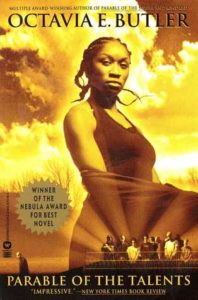
The Biblical Parable of the Sower, in as brief an account as I can manage, follows a man who sowed seed into three different kinds of land with mixed success. The Parable of the Talents is about a man who went away and left his home and land in the care of his slaves. The titles of the novel we just read and its sequel are taken directly from their biblical parallels, and this has got me to thinking a lot about how religions build upon each other. I think it might be some kind of sacrilege for me to make this observation for some faiths, so I’m going to proceed with that in mind.
My upbringing is Catholic, and I found out recently that a few of my friends hadn’t always realized that Catholicism is a denomination of Christianity. One of the times when Lauren is talking with Bankole about Earthseed, he comments that the Christian faiths practiced now probably don’t very strongly resemble what Jesus originally taught or practiced himself. Case in point, I can name about five denominations of Christianity off the top of my head, and I’m willing to bet there are plenty more than that out there that are each very different from each other. So it was striking to me that a few of my friends, of different religious upbringings, understood Catholicism to be so different from what they learned and/or practiced in their respective faiths that they, at one point, thought it was entirely separate from Christianity. This may be a simpler misunderstanding than I’m making it out to be, but while I was still a practicing Catholic, I identified much more strongly with the classification of “Christian” rather than with that of “Catholic.” So this semester has gotten me to observing more and more differences between the different denominations, and more recently with our reading, I’ve been thinking a lot about how Christianity was originally practiced in its earliest days.
Earthseed is influenced by Lauren’s Christian Baptist upbringing. I would like to trace back how Christianity has its origins in Judaism, and that there are additionally Pagan influences present in Christianity, and Islam is, in turn, rooted in part in Christianity. I often think of these monotheistic faiths (obviously not anything Pagan) as tied in together, although that’s certainly a simplification of many branches of faiths practiced by billions of people. My goal with this post was to point out some origins and make some observations about the roots and transformation of religion over time. Earthseed is ostensibly all about change, but it’s built upon a great giant history of religion. Lauren wanted to figure out what the truth was and write it down, embrace it, and transform along with it. However, I’m not convinced she is doing everything she means to in her creation of Earthseed, or at least, acknowledging it. Obviously, it was Octavia Butler who named the novel itself, and not Lauren, but I caught myself wondering more than once why the book wasn’t named after Lauren’s religion. My proposed answer: trouble ahead. Lauren is human, and humans can’t continue to adapt forever. We build upon what we know, we’re stubborn, and we rehash and hold on to our past. Have a look at the first few pages of Parable of the Talents, you’ll see what I mean. The novels are likely named after the biblical parables because that’s what Lauren knows, and she’s not able to escape it. From the little I’ve read of the sequel, I already appreciate that there are things going wrong with Earthseed, that it is acknowledging the problems with creating a new following of a faith. If it left off, point end, at where we stopped in Sower, than it might have created an illusion unfaithful to all of the struggle Lauren has faced, and what’s more, the great history of religion changing out of its creators hands and morphing into something that has the potential to hurt those who get in its way.
